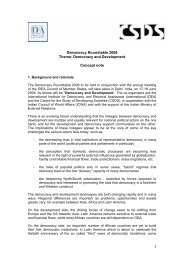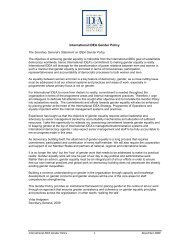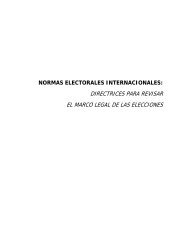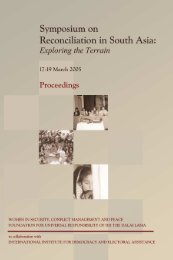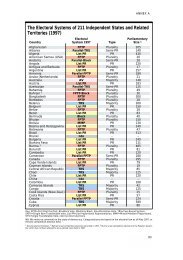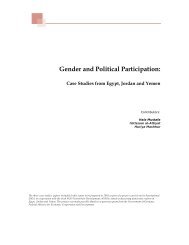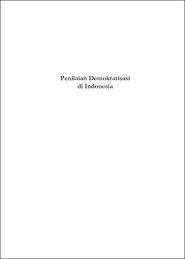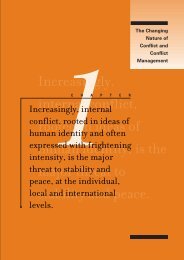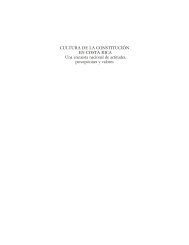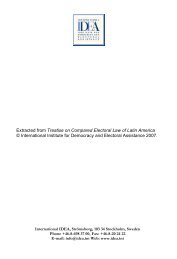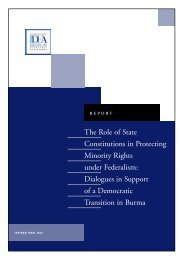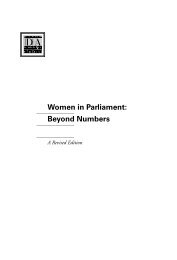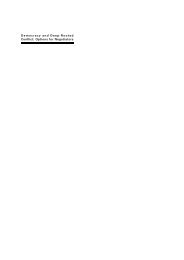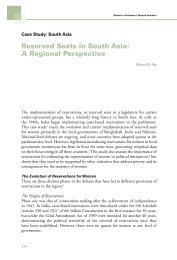Assessing the Quality of Democracy: An ... - International IDEA
Assessing the Quality of Democracy: An ... - International IDEA
Assessing the Quality of Democracy: An ... - International IDEA
You also want an ePaper? Increase the reach of your titles
YUMPU automatically turns print PDFs into web optimized ePapers that Google loves.
<strong>Assessing</strong> <strong>the</strong> <strong>Quality</strong><br />
<strong>of</strong> <strong>Democracy</strong><br />
<strong>An</strong> Overview <strong>of</strong> <strong>the</strong><br />
<strong>International</strong> <strong>IDEA</strong><br />
Framework
<strong>Assessing</strong> <strong>the</strong> <strong>Quality</strong><br />
<strong>of</strong> <strong>Democracy</strong><br />
<strong>An</strong> Overview <strong>of</strong> <strong>the</strong><br />
<strong>International</strong> <strong>IDEA</strong><br />
Framework<br />
Editor<br />
Todd Landman<br />
Contributors<br />
David Beetham<br />
Edzia Carvalho<br />
Stuart Weir
© <strong>International</strong> Institute for <strong>Democracy</strong> and Electoral Assistance 2008<br />
<strong>International</strong> <strong>IDEA</strong> publications are independent <strong>of</strong> specific national or political<br />
interests. Views expressed in this publication do not necessarily represent <strong>the</strong> views<br />
<strong>of</strong> <strong>International</strong> <strong>IDEA</strong>, its Board or its Council Members.<br />
Applications for permission to reproduce or translate all or any part <strong>of</strong> this<br />
publication should be made to:<br />
<strong>International</strong> <strong>IDEA</strong><br />
SE -103 34 Stockholm<br />
Sweden<br />
Graphic design by: Santángelo Diseño<br />
Printed by: Bulls Graphics<br />
Cover illustration © Alberto Ruggieri/Illustration Works/Corbis/Scanpix<br />
ISBN 978-91-85724-44-4
Contents<br />
Setting <strong>the</strong> scene 7<br />
<strong>Assessing</strong> democracy 9<br />
The approach 9<br />
The framework 10<br />
Experiences <strong>of</strong> applying <strong>the</strong> framework 13<br />
The steps involved in carrying out an assessment 16<br />
<strong>Democracy</strong> assessment outputs 17<br />
<strong>Assessing</strong> for reform 18<br />
Summary 22<br />
Notes 23<br />
Appendix. The search questions 25<br />
<strong>An</strong>nex. About <strong>International</strong> <strong>IDEA</strong> 31<br />
5
<strong>Assessing</strong> <strong>the</strong> <strong>Quality</strong> <strong>of</strong> <strong>Democracy</strong>:<br />
<strong>An</strong> Overview <strong>of</strong> <strong>the</strong> <strong>International</strong> <strong>IDEA</strong><br />
Framework<br />
Setting <strong>the</strong> scene<br />
<strong>Democracy</strong> is <strong>the</strong> predominant form <strong>of</strong> government in <strong>the</strong> world today.<br />
While for <strong>the</strong> greater part <strong>of</strong> world history democracy has been a<br />
recent phenomenon, 1 successive ‘waves’ <strong>of</strong> democracy throughout <strong>the</strong><br />
20th century have meant that by <strong>the</strong> new millennium more countries<br />
are now governed through democratic than through non-democratic<br />
forms <strong>of</strong> rule. Various attempts to enumerate democracies in <strong>the</strong><br />
world agree that more than 60 per cent <strong>of</strong> all countries today have in<br />
place at least some minimal form <strong>of</strong> democratic institutions and procedures.<br />
2 The Community <strong>of</strong> Democracies lists more than 100 countries<br />
and <strong>the</strong> United Nations <strong>International</strong> Conference on New or<br />
Restored Democracies (ICNRD) has grown in depth, breadth and<br />
importance since its inauguration in 1988 as a forum for global democratic<br />
development. Increasingly, governmental, intergovernmental<br />
and non-governmental organizations emphasize that democracy is an<br />
end in itself, as well as an important means to o<strong>the</strong>r ends such as<br />
economic development, poverty reduction and greater protection <strong>of</strong><br />
internationally recognized human rights. 3<br />
There have been many explanations for <strong>the</strong> remarkable growth, spread<br />
and pace <strong>of</strong> democratization. Internal explanations focus on major<br />
socio-economic transformations; mobilization by social movements<br />
and civil society organizations; class alliances, challenges and revolutions<br />
(‘coloured’ or o<strong>the</strong>rwise); and elite agreements and concessions.<br />
External explanations focus on defeat <strong>of</strong> <strong>the</strong> incumbent regime in war;<br />
<strong>the</strong> role <strong>of</strong> ‘contagion’ from democratization processes in neighbouring<br />
states; <strong>the</strong> diffusion <strong>of</strong> democratic values through processes <strong>of</strong> globalization;<br />
and various forms <strong>of</strong> international intervention, including support<br />
for civil society groups and nascent political party organizations;<br />
state building; institutionalization; and <strong>the</strong> specification <strong>of</strong> criteria for<br />
appropriate and acceptable forms <strong>of</strong> democratic rule.<br />
7
<strong>Assessing</strong> <strong>the</strong> <strong>Quality</strong> <strong>of</strong> <strong>Democracy</strong>: <strong>An</strong> Overview <strong>of</strong> <strong>the</strong> <strong>International</strong> <strong>IDEA</strong> Framework<br />
A crucial element in mapping, explaining and encouraging this<br />
growth in democracy has been <strong>the</strong> need for valid, meaningful and reliable<br />
ways to measure and assess democratic progress and <strong>the</strong> quality<br />
<strong>of</strong> democracy itself. Scholars and practitioners have adopted a number<br />
<strong>of</strong> strategies to measure democracy, including categorical measures<br />
(democracy vs non-democracy), scale measures (e.g. a rating on a 1<br />
to 10 scale), objective measures (e.g. voter turnout and party share <strong>of</strong><br />
<strong>the</strong> vote), hybrid measures <strong>of</strong> democratic practices, and perceptions<br />
<strong>of</strong> democracy based on mass public opinion surveys. In certain instances,<br />
measures have been developed for particular needs and <strong>the</strong>n<br />
used for o<strong>the</strong>r purposes, while in o<strong>the</strong>rs general measures <strong>of</strong> democracy<br />
have been developed for a wide range <strong>of</strong> application by <strong>the</strong> academic<br />
and policy community (e.g. <strong>the</strong> ‘Polity’ data set developed by<br />
<strong>the</strong> University <strong>of</strong> Maryland). The quest for comparability and broad<br />
temporal and spatial coverage, however, has meant a certain sacrifice<br />
<strong>of</strong> <strong>the</strong>se measures’ ability to capture <strong>the</strong> context-specific features <strong>of</strong><br />
democracy, while <strong>the</strong> turn to good governance, accountability and<br />
aid conditionality among leading international donors has created<br />
additional demand for measures <strong>of</strong> democracy that can be used for<br />
country-, sector- and programme-level assessments.<br />
In response to <strong>the</strong>se many developments and <strong>the</strong> proliferation <strong>of</strong> democracy<br />
measures, <strong>the</strong> <strong>International</strong> Institute for <strong>Democracy</strong> and<br />
Electoral Assistance (<strong>International</strong> <strong>IDEA</strong>) has developed an alternative<br />
framework for democracy assessment that moves away from country<br />
ranking and external judgement towards an approach <strong>of</strong> comprehensive<br />
assessment based on national assessment teams led by governments<br />
or civil society and academic institutions. The framework combines<br />
a commitment to <strong>the</strong> fundamental principles <strong>of</strong> democracy, mediating<br />
values related to <strong>the</strong>se principles, and a comprehensive range <strong>of</strong><br />
questions about democratic performance. There is scope in <strong>the</strong> framework<br />
for using existing measures while at <strong>the</strong> same time incorporating<br />
much more context-specific information on <strong>the</strong> quality <strong>of</strong> democracy<br />
that can <strong>the</strong>n be linked to domestic processes <strong>of</strong> democratic reform.<br />
Its use across new and old democracies around <strong>the</strong> world as diverse as<br />
Mongolia and Italy, Bangladesh and Kenya, and Peru and Australia<br />
has shown that it works, and demand continues for <strong>the</strong> framework to<br />
be applied in new and challenging contexts.<br />
After numerous applications <strong>of</strong> <strong>the</strong> assessment framework in no fewer<br />
than 20 countries, <strong>International</strong> <strong>IDEA</strong>, along with Democratic Audit<br />
in <strong>the</strong> United Kingdom (UK), <strong>the</strong> Human Rights Centre at <strong>the</strong><br />
University <strong>of</strong> Essex in <strong>the</strong> UK, and <strong>the</strong> larger ‘State <strong>of</strong> <strong>Democracy</strong>’<br />
network, has thoroughly revised <strong>the</strong> framework into a new hand-<br />
8
<strong>International</strong> <strong>IDEA</strong><br />
book, entitled <strong>Assessing</strong> <strong>the</strong> <strong>Quality</strong> <strong>of</strong> <strong>Democracy</strong>: A Practical Guide.<br />
The Guide includes all <strong>the</strong> normative principles and practical elements<br />
<strong>of</strong> <strong>the</strong> framework, experiences from those countries that have<br />
used it, and <strong>the</strong> ways in which democracy assessment can be linked<br />
to <strong>the</strong> process <strong>of</strong> democratic reform. This much shorter Overview<br />
provides an introduction to <strong>the</strong> framework, including its fundamental<br />
democratic principles, its mediating values, <strong>the</strong> assessment search<br />
questions, examples <strong>of</strong> its application around <strong>the</strong> world, <strong>the</strong> typical<br />
steps involved in carrying out an assessment, and its value as a tool<br />
for promoting democratic reform.<br />
The assessment framework outlined here (and more fully in <strong>the</strong><br />
Guide) upholds <strong>International</strong> <strong>IDEA</strong>’s fundamental principles in supporting<br />
democracy worldwide.<br />
• Democratization is a process that requires time and patience.<br />
• <strong>Democracy</strong> is not achieved through elections alone.<br />
• Democratic practices can be compared but not prescribed.<br />
• <strong>Democracy</strong> is built from within societies.<br />
• <strong>Democracy</strong> cannot be imported or exported, but can be supported. 4<br />
Taken toge<strong>the</strong>r, <strong>the</strong> Overview and <strong>the</strong> Guide provide a robust package<br />
<strong>of</strong> materials that are grounded in many years <strong>of</strong> experience and<br />
practical application in old and new democracies across <strong>the</strong> world.<br />
Both volumes should prove highly attractive to grass-roots democracy<br />
activists, civil society organizations, reform-minded actors in<br />
political society and in government, and those international donor<br />
agencies and intergovernmental and non-governmental organizations<br />
that are committed to building democracy for <strong>the</strong> future.<br />
<strong>Assessing</strong> democracy<br />
The approach<br />
The fundamental and underlying question in democracy assessment is:<br />
‘How democratic are our country and its government?’<br />
There are many ways to answer this question. The <strong>International</strong> <strong>IDEA</strong><br />
framework takes a particular approach that marks it out from o<strong>the</strong>r<br />
approaches to democracy assessment and measurement. 5 The main<br />
features <strong>of</strong> <strong>the</strong> <strong>International</strong> <strong>IDEA</strong> approach are as follows.<br />
9
<strong>Assessing</strong> <strong>the</strong> <strong>Quality</strong> <strong>of</strong> <strong>Democracy</strong>: <strong>An</strong> Overview <strong>of</strong> <strong>the</strong> <strong>International</strong> <strong>IDEA</strong> Framework<br />
The framework<br />
• Only citizens and o<strong>the</strong>rs who live in <strong>the</strong> country being assessed<br />
should carry out a democracy assessment, since only <strong>the</strong>y can know<br />
from experience how <strong>the</strong>ir country’s history and culture shape its approach<br />
to democratic principles.<br />
• A democracy assessment by citizens and residents <strong>of</strong> a country may<br />
be initiated by government or external agencies only under strict safeguards<br />
<strong>of</strong> <strong>the</strong> independence <strong>of</strong> <strong>the</strong> assessment.<br />
• The prime purpose <strong>of</strong> democracy assessment is to contribute to public<br />
debate and consciousness raising, and <strong>the</strong> exercise ought to allow for <strong>the</strong><br />
expression <strong>of</strong> popular understanding as well as any elite consensus.<br />
• The assessment should assist in identifying priorities for reform and<br />
monitoring <strong>the</strong>ir progress.<br />
• The criteria for assessment should be derived from clearly defined<br />
democratic principles and should embrace <strong>the</strong> widest range <strong>of</strong> democracy<br />
issues, while allowing assessors to choose priorities for examination<br />
according to local needs.<br />
• The assessments should be qualitative judgements <strong>of</strong> strengths and<br />
weaknesses in each area, streng<strong>the</strong>ned by quantitative measures<br />
where appropriate.<br />
• The assessors should choose benchmarks or standards for assessment,<br />
based on <strong>the</strong> country’s history, regional practice and international<br />
norms, as <strong>the</strong>y think appropriate.<br />
• The assessment process should involve wide public consultation, including<br />
a national workshop to validate <strong>the</strong> findings.<br />
• Old as well as new democracies can and should be subject to a similar<br />
framework <strong>of</strong> assessment.<br />
The primacy <strong>of</strong> internal actors and citizens <strong>of</strong> a country is an essential<br />
feature <strong>of</strong> <strong>the</strong> <strong>International</strong> <strong>IDEA</strong> approach, while it also allows for<br />
international expertise, support and resources to complement <strong>the</strong> assessment<br />
process. The experience <strong>of</strong> assessments thus far has shown various<br />
degrees <strong>of</strong> learning, sharing and support through local assessment<br />
teams, <strong>the</strong> State <strong>of</strong> <strong>Democracy</strong> network, international donor agencies,<br />
international academic experts, representatives <strong>of</strong> intergovernmental<br />
and non-governmental organizations and o<strong>the</strong>r key actors. In this way,<br />
<strong>the</strong> <strong>International</strong> <strong>IDEA</strong> approach avoids many <strong>of</strong> <strong>the</strong> pitfalls <strong>of</strong> existing<br />
approaches, 6 while at <strong>the</strong> same time developing local ownership and<br />
empowering citizens to improve <strong>the</strong> quality <strong>of</strong> <strong>the</strong>ir own democracy in<br />
ways that reflect <strong>the</strong>ir own history, culture and national priorities.<br />
The key democratic principles that form <strong>the</strong> basis for <strong>the</strong> assessment<br />
framework are popular control over decision makers and political<br />
10
<strong>International</strong> <strong>IDEA</strong><br />
equality <strong>of</strong> those who exercise that control. These principles define<br />
what democrats at all times and in all places have struggled for:<br />
• making popular control over public decision making more effective<br />
and more inclusive;<br />
• removing elite monopoly over decision making and its benefits; and<br />
• overcoming obstacles to <strong>the</strong> equal exercise <strong>of</strong> citizenship rights, such<br />
as those <strong>of</strong> gender, ethnicity, religion, language, class and wealth,<br />
among many o<strong>the</strong>rs.<br />
The framework derives seven mediating values from <strong>the</strong> two democratic<br />
principles.<br />
• Participation. Without citizen participation, and <strong>the</strong> rights, <strong>the</strong><br />
freedoms and <strong>the</strong> means to participate, <strong>the</strong> principle <strong>of</strong> popular control<br />
over government cannot begin to be realized.<br />
• Authorization. The starting point <strong>of</strong> participation is to authorize public<br />
representatives or <strong>of</strong>ficials through free and fair electoral choice,<br />
and in a manner which produces a legislature that is representative <strong>of</strong><br />
<strong>the</strong> different tendencies <strong>of</strong> public opinion.<br />
• Representation. If different groups <strong>of</strong> citizens are treated on an equal<br />
footing, according to <strong>the</strong>ir numbers, <strong>the</strong>n <strong>the</strong> main public institutions<br />
will be socially representative <strong>of</strong> <strong>the</strong> citizen body as a whole.<br />
• Accountability. The accountability <strong>of</strong> all <strong>of</strong>ficials, both to <strong>the</strong> public directly<br />
and through <strong>the</strong> mediating institutions <strong>of</strong> parliament, <strong>the</strong> courts,<br />
<strong>the</strong> ombudsman and o<strong>the</strong>r watchdog agencies, is crucial if <strong>of</strong>ficials are<br />
to act as agents or servants <strong>of</strong> <strong>the</strong> people ra<strong>the</strong>r than as <strong>the</strong>ir masters.<br />
• Transparency. Without openness or transparency in government, no<br />
effective accountability is possible.<br />
• Responsiveness. Responsiveness to public needs, through a variety <strong>of</strong><br />
institutions through which those needs can be articulated, is a key<br />
indication <strong>of</strong> <strong>the</strong> level <strong>of</strong> controlling influence which people have over<br />
government.<br />
• Solidarity. While equality runs as a principle through all <strong>the</strong> mediating<br />
values, it finds particular expression in <strong>the</strong> solidarity which<br />
citizens <strong>of</strong> democracies show to those who differ from <strong>the</strong>mselves at<br />
home, and towards popular struggles for democracy abroad.<br />
The mediating values have certain requirements and institutional<br />
means for <strong>the</strong>ir realization.<br />
The overall structure <strong>of</strong> <strong>the</strong> assessment framework is derived from <strong>the</strong><br />
democratic principles and mediating values to include four main pillars,<br />
each <strong>of</strong> which has fur<strong>the</strong>r divisions used to organize 90 search ques-<br />
11
<strong>Assessing</strong> <strong>the</strong> <strong>Quality</strong> <strong>of</strong> <strong>Democracy</strong>: <strong>An</strong> Overview <strong>of</strong> <strong>the</strong> <strong>International</strong> <strong>IDEA</strong> Framework<br />
tions (15 overarching questions and 75 specific questions) that form <strong>the</strong><br />
core <strong>of</strong> democracy assessment. These main pillars are as follows.<br />
1. Citizenship, law and rights<br />
<strong>Democracy</strong> starts with <strong>the</strong> citizen, and <strong>the</strong> subject <strong>of</strong> <strong>the</strong> first pillar <strong>of</strong><br />
<strong>the</strong> framework is <strong>the</strong> rights <strong>of</strong> <strong>the</strong> citizen and <strong>the</strong> ability <strong>of</strong> <strong>the</strong> state to<br />
guarantee equal rights <strong>of</strong> citizenship to all through its constitutional<br />
and legal processes. The assessment includes civil, political, economic<br />
and social rights.<br />
2. Representative and accountable government<br />
The second pillar comprises <strong>the</strong> institutions <strong>of</strong> representative and accountable<br />
government, including <strong>the</strong> electoral process, <strong>the</strong> political<br />
party system, <strong>the</strong> role <strong>of</strong> parliament or <strong>the</strong> legislature and o<strong>the</strong>r institutions<br />
in securing <strong>the</strong> integrity and accountability <strong>of</strong> government<br />
<strong>of</strong>ficials, and civilian control over <strong>the</strong> military and police forces.<br />
3. Civil society and popular participation<br />
The third pillar is devoted to what is conventionally called ‘civil society’.<br />
Democratic institutions depend for <strong>the</strong>ir effective functioning<br />
both on guaranteed rights upheld by <strong>the</strong> legal process and on an alert<br />
and active citizen body.<br />
4. <strong>Democracy</strong> beyond <strong>the</strong> state<br />
The fourth pillar concerns <strong>the</strong> international dimensions <strong>of</strong> democracy.<br />
Its rationale is that countries do not form isolated units, but<br />
are mutually interdependent, especially in <strong>the</strong>ir degree <strong>of</strong> democratic<br />
progress. The assessment takes into account <strong>the</strong> external influences on<br />
a country’s democracy and <strong>the</strong> country’s democratic impact abroad.<br />
Figure 1 shows <strong>the</strong> relationship between <strong>the</strong> democratic principles,<br />
<strong>the</strong> mediating values, <strong>the</strong> structure <strong>of</strong> <strong>the</strong> framework, and <strong>the</strong> search<br />
questions. The appendix to this Overview includes a full list <strong>of</strong> <strong>the</strong><br />
90 search questions, while part 2 <strong>of</strong> <strong>the</strong> Guide provides comprehensive<br />
guidance on ‘what to look for’ in answering each search question,<br />
generalized sources <strong>of</strong> information, data and indicators, and standards<br />
<strong>of</strong> good practice. These elements <strong>of</strong> <strong>the</strong> framework provide <strong>the</strong> core<br />
substantive content <strong>of</strong> an assessment, and when taken toge<strong>the</strong>r reflect<br />
a larger set <strong>of</strong> values and principles associated with a general normative<br />
commitment to democracy and democratic values. Those who<br />
want a quick view <strong>of</strong> what <strong>the</strong> method involves can turn straight to<br />
<strong>the</strong> search questions in <strong>the</strong> appendix.<br />
12
<strong>International</strong> <strong>IDEA</strong><br />
Figure 1: The <strong>International</strong> <strong>IDEA</strong> democracy assessment framework<br />
<br />
opular control<br />
olitical equality<br />
<br />
articipation<br />
Authorization<br />
epresentation<br />
Accountability<br />
Transparency<br />
esponsiveness<br />
Solidarity<br />
<br />
<br />
Nationhood and citizenship<br />
The rule <strong>of</strong> law and access to ustice<br />
Civil and political rights<br />
Economic and social rights<br />
<br />
Free and fair elections<br />
Democratic role <strong>of</strong> political parties<br />
Effective and responsive government<br />
The democratic effectiveness <strong>of</strong> parliament<br />
Civilian control <strong>of</strong> <strong>the</strong> military and police<br />
Integrity in public life<br />
<br />
The media in a democratic society<br />
olitical participation<br />
Decentralization<br />
<br />
External influences on <strong>the</strong> countrys democracy<br />
The countrys democratic impact abroad<br />
<br />
1 Overarching questions<br />
Specific questions<br />
Questions in total<br />
Experiences <strong>of</strong> applying <strong>the</strong> framework<br />
There have been a total <strong>of</strong> 17 assessment projects so far, comprising not<br />
fewer than 20 countries (since <strong>the</strong> South Asia democracy assessment<br />
was carried out in five countries). A team <strong>of</strong> academics is currently carrying<br />
out an assessment in Mexico, while more assessments are planned<br />
for countries in Latin America, Sou<strong>the</strong>rn Europe, Eastern Europe and<br />
Africa. In addition, certain features <strong>of</strong> <strong>the</strong> framework have been adopted<br />
by <strong>the</strong> Open Society Institute’s AfriMap project and in <strong>the</strong> United<br />
Nations Development Programme (UNDP) Oslo Governance Centre’s<br />
work on poverty reduction and gender mainstreaming.<br />
<strong>International</strong> <strong>IDEA</strong> has held a series <strong>of</strong> expert meetings for <strong>the</strong> State<br />
<strong>of</strong> <strong>Democracy</strong> Network – in June 2004, in London; in 2005, at <strong>the</strong><br />
University <strong>of</strong> Essex; in 2006, at <strong>the</strong> meeting <strong>of</strong> <strong>the</strong> <strong>International</strong> Political<br />
Science Association (IPSA) in Fukuoka; and in March 2007,<br />
in Stockholm, to reflect on <strong>the</strong> experiences <strong>of</strong> applying <strong>the</strong> framework<br />
across a range <strong>of</strong> different country contexts. <strong>International</strong> <strong>IDEA</strong><br />
also made numerous presentations at two national workshops for <strong>the</strong><br />
Fifth <strong>International</strong> Conference on New or Restored Democracies<br />
(ICNRD-5) in Ulaanbaatar in 2003 and 2006, and <strong>the</strong> inaugural<br />
13
<strong>Assessing</strong> <strong>the</strong> <strong>Quality</strong> <strong>of</strong> <strong>Democracy</strong>: <strong>An</strong> Overview <strong>of</strong> <strong>the</strong> <strong>International</strong> <strong>IDEA</strong> Framework<br />
meeting <strong>of</strong> <strong>the</strong> Sixth <strong>International</strong> Conference on New or Restored<br />
Democracies (ICNRD-6) in Doha in November 2006. The reports<br />
and experiences from <strong>the</strong> different assessments reveal a remarkably diverse<br />
range <strong>of</strong> democratic situations as between countries, approaches<br />
and techniques. All <strong>the</strong> assessments that have taken place have<br />
remained committed to <strong>the</strong> standard methodology and <strong>the</strong> central<br />
principle <strong>of</strong> local ownership <strong>of</strong> <strong>the</strong> assessment process that encompasses<br />
<strong>the</strong> research, analysis and consultation processes, and <strong>the</strong> identification<br />
<strong>of</strong> priorities for future reform. But, as Krishna Hachhethu,<br />
a Nepalese member <strong>of</strong> <strong>the</strong> South Asia regional assessment team, says,<br />
‘<strong>Democracy</strong> has many stories’. This straightforward and insightful<br />
observation captures <strong>the</strong> essence <strong>of</strong> <strong>the</strong> approach: a standard method<br />
derived from democratic principles and values elicits democracy’s<br />
many stories from around <strong>the</strong> world.<br />
The assessment methodology was invented and first applied by Democratic<br />
Audit in <strong>the</strong> UK. It was developed for universal use under<br />
<strong>the</strong> direct aegis <strong>of</strong> <strong>International</strong> <strong>IDEA</strong> and <strong>the</strong>n pioneered over a<br />
six-month period in eight countries – Bangladesh, El Salvador, Italy,<br />
Kenya, Malawi, Peru, New Zealand and South Korea. The pilot assessments<br />
covered different regions <strong>of</strong> <strong>the</strong> world and a mix <strong>of</strong> developed<br />
and developing countries in an effort to test <strong>the</strong> process. Nearly<br />
all involved a national conference <strong>of</strong> leading experts and interested<br />
parties within each country.<br />
The pilot assessments showed that it has been relatively easy to:<br />
• obtain a broadly agreed constitution with a bill <strong>of</strong> rights;<br />
• establish some sort <strong>of</strong> <strong>of</strong>fice <strong>of</strong> ombudsmen and/or a public defender;<br />
• hold free elections and establish universal suffrage;<br />
• revive local government; and<br />
• ensure respect for and <strong>the</strong> protection <strong>of</strong> basic freedoms such as party<br />
association, press, speech and assembly.<br />
But <strong>the</strong>y also revealed that has been more difficult to establish:<br />
• <strong>the</strong> effective inclusion <strong>of</strong> minorities and women’s participation;<br />
• equal access to justice and protection <strong>of</strong> <strong>the</strong> right to life;<br />
• meaningful intra-party democracy;<br />
• control <strong>of</strong> executives;<br />
• a reduction in private influence and private interests in <strong>the</strong> public<br />
sphere; and<br />
• a significant role for opposition parties.<br />
14
<strong>International</strong> <strong>IDEA</strong><br />
Since 2000, <strong>the</strong> assessment framework has travelled widely across<br />
regions and countries at different stages <strong>of</strong> democratization. The pilot<br />
assessments have been followed by assessment exercises in (in alphabetical<br />
order) Australia, Bosnia and Herzegovina, <strong>the</strong> European<br />
Union (EU), Ireland, Latvia, Mongolia, <strong>the</strong> Ne<strong>the</strong>rlands, Nor<strong>the</strong>rn<br />
Ireland, <strong>the</strong> Philippines, <strong>the</strong> South Asia region (covering Bangladesh,<br />
India, Nepal, Pakistan and Sri Lanka) and <strong>the</strong> UK (<strong>the</strong> latest audit).<br />
These ‘second-generation’ assessments were largely conducted independently<br />
<strong>of</strong> <strong>International</strong> <strong>IDEA</strong>, and in many cases resulted from a<br />
deliberate selection <strong>of</strong> <strong>the</strong> methodology as <strong>the</strong> most appropriate from<br />
among <strong>the</strong> many assessment methods currently used internationally.<br />
The origins, funding and form <strong>of</strong> <strong>the</strong> assessments differ greatly. The<br />
pilot assessments funded by <strong>International</strong> <strong>IDEA</strong> were all universitybased<br />
and most <strong>of</strong> <strong>the</strong> non-<strong>International</strong> <strong>IDEA</strong> assessments so far<br />
– nine <strong>of</strong> <strong>the</strong> individual country assessments and <strong>the</strong> South Asian<br />
regional assessment – have <strong>the</strong>ir roots in universities, but <strong>the</strong>re have<br />
been wide variations in <strong>the</strong> funding and in <strong>the</strong> process <strong>of</strong> assessment,<br />
ranging from nationally and internationally well-funded assessments<br />
(e.g. those undertaken in Australia, Latvia and Mongolia) to those<br />
that have been under-resourced and have been carried out in piecemeal<br />
fashion (e.g. <strong>the</strong> assessments in New Zealand and <strong>the</strong> Philippines).<br />
Three assessments (Bosnia and Herzegovina, Ireland and<br />
<strong>the</strong> UK) sprang from civil society, while two (<strong>the</strong> Ne<strong>the</strong>rlands and<br />
Mongolia) were government-led, although <strong>the</strong> Dutch assessment was<br />
funded wholly by <strong>the</strong> government and <strong>the</strong> Mongolian assessment received<br />
technical assistance from <strong>the</strong> UNDP’s Oslo Governance Centre<br />
and funding from various international donors. The governmentled<br />
assessments in Mongolia, <strong>the</strong> Ne<strong>the</strong>rlands and Latvia (where <strong>the</strong><br />
assessment was in a sense state-sponsored) were carried out without<br />
inappropriate intervention by <strong>the</strong> government and in many ways have<br />
tied <strong>the</strong> government to <strong>the</strong> larger agenda <strong>of</strong> democratic reform, although<br />
such a model may not be appropriate in all contexts.<br />
There have been as many differing arrangements for carrying out assessments<br />
as <strong>the</strong>re have been projects. It is clear across <strong>the</strong> experiences<br />
that <strong>the</strong> breadth <strong>of</strong> <strong>the</strong> investigations necessary to conduct full assessments<br />
has generally obliged <strong>the</strong> projects to involve a wide range<br />
<strong>of</strong> contributors. Assessment teams have variously comprised national<br />
and international academics, researchers and analysts from intergovernmental<br />
and non-governmental organizations, members <strong>of</strong> <strong>the</strong><br />
executive, legislative and judicial branches <strong>of</strong> government, and representatives<br />
from civil society and <strong>the</strong> media. The norm seems to be<br />
that projects generally have a small core <strong>of</strong> people who coordinate <strong>the</strong><br />
15
<strong>Assessing</strong> <strong>the</strong> <strong>Quality</strong> <strong>of</strong> <strong>Democracy</strong>: <strong>An</strong> Overview <strong>of</strong> <strong>the</strong> <strong>International</strong> <strong>IDEA</strong> Framework<br />
research and draft reports toge<strong>the</strong>r with a wider set <strong>of</strong> experts, who<br />
have <strong>of</strong>ten been recruited from outside <strong>the</strong> bounds <strong>of</strong> <strong>the</strong> institution<br />
carrying out <strong>the</strong> assessment and who usually seem to work independently<br />
<strong>of</strong> each o<strong>the</strong>r.<br />
The steps involved in carrying out an assessment<br />
<strong>Assessing</strong> <strong>the</strong> quality <strong>of</strong> democracy is a large and complex task that<br />
involves many stakeholders and is affected by a variety <strong>of</strong> national and<br />
context-specific factors, including <strong>the</strong> size <strong>of</strong> <strong>the</strong> country (population<br />
and geography), its level <strong>of</strong> economic development, its type <strong>of</strong> societal<br />
cleavages and level <strong>of</strong> fragmentation, and its history <strong>of</strong> democracy<br />
and democratic stability, among many o<strong>the</strong>rs. Despite this complexity<br />
and variety, <strong>the</strong> history <strong>of</strong> <strong>the</strong> democracy assessment framework<br />
has shown that it can apply equally across very different countries.<br />
The assessments have been carried out in new and old democracies,<br />
large and small countries, post-authoritarian and post-conflict countries,<br />
and rich and poor countries.<br />
With this universal applicability comes a series <strong>of</strong> standard steps that<br />
all assessments undergo in order to make <strong>the</strong> best <strong>of</strong> <strong>the</strong> assessment<br />
experience. These include: (a) <strong>the</strong> initial decisions and agenda setting<br />
for <strong>the</strong> process <strong>of</strong> assessment; (b) <strong>the</strong> data collection, analysis and<br />
organization that form <strong>the</strong> core <strong>of</strong> <strong>the</strong> assessment; and (c) a national<br />
workshop and stakeholder event in which <strong>the</strong> final report is launched,<br />
discussed and evaluated and in which <strong>the</strong> future <strong>of</strong> democracy is discussed.<br />
Figure 2 summarizes <strong>the</strong> main elements <strong>of</strong> <strong>the</strong>se three steps,<br />
while part 1 <strong>of</strong> <strong>the</strong> Guide contains two flowcharts that map in greater<br />
detail <strong>the</strong> components <strong>of</strong> each stage.<br />
Step 1<br />
Step 2<br />
includes all those decisions concerning <strong>the</strong> purpose <strong>of</strong> <strong>the</strong> assessment,<br />
<strong>the</strong> context in which it will be conducted, <strong>the</strong> range <strong>of</strong> benchmarks<br />
and comparators that will be used, <strong>the</strong> personnel that will carry out<br />
<strong>the</strong> assessment and many o<strong>the</strong>r crucial decisions.<br />
forms <strong>the</strong> core <strong>of</strong> <strong>the</strong> assessment and takes <strong>the</strong> largest proportion<br />
<strong>of</strong> <strong>the</strong> time, since it involves collecting and analysing data in order<br />
to provide valid, meaningful and reliable answers to all <strong>the</strong> search<br />
questions (every assessment thus far has provided answers to all <strong>the</strong><br />
questions). The time it takes to complete an assessment is necessarily a<br />
function <strong>of</strong> <strong>the</strong> complexity <strong>of</strong> <strong>the</strong> context in which it is being carried<br />
out, <strong>the</strong> available capacity and resources, and <strong>the</strong> initial parameters<br />
that have been established in step 1.<br />
16
<strong>International</strong> <strong>IDEA</strong><br />
Step 3<br />
is a significant launch event that involves all relevant stakeholders, <strong>the</strong><br />
media, key actors from civil, political and economic society, and in<br />
many cases <strong>the</strong> international community. It is a time to build consensus<br />
around <strong>the</strong> main findings <strong>of</strong> <strong>the</strong> report and to reflect on <strong>the</strong> kinds<br />
<strong>of</strong> reform that can be designed and implemented, as well as <strong>the</strong> ways<br />
in which <strong>the</strong> entire experience can be evaluated and assessed.<br />
Figure 2: The steps involved in carrying out a democracy assessment<br />
<br />
<br />
urpose<br />
Content<br />
Benchmarks comparators<br />
Selection <strong>of</strong> assessors<br />
ange <strong>of</strong> sources<br />
Stakeholder consultation<br />
ublication dissemination strategy<br />
Democratic reform<br />
Time frame<br />
Budget and resource needs<br />
<br />
<br />
Constructing a bibliography<br />
Identifying sorting data<br />
Arranging prioritizing items for inclusion<br />
Confirming answers to search questions<br />
Writing a draft text<br />
<br />
<br />
Involve all relevant stakeholders<br />
lenary sessions <strong>the</strong>med workshops<br />
esolutions on <strong>the</strong> way forward<br />
Linking <strong>the</strong> findings to a reform agenda<br />
Evaluation assessment <strong>of</strong> <strong>the</strong> process outcomes and outputs<br />
<strong>Democracy</strong> assessment outputs<br />
There is considerable variety in <strong>the</strong> balance <strong>of</strong> <strong>the</strong> outputs between<br />
full assessments, special reports, partial audits and monitoring or<br />
follow-up reports, and in <strong>the</strong> way in which <strong>the</strong>y are published and<br />
disseminated. Most <strong>of</strong> <strong>the</strong> projects have published a single volume<br />
reporting on a full assessment, while some have published additional<br />
supplementary materials (e.g. <strong>the</strong> South Asian team published separate<br />
Country Reports and is considering publishing its Case Studies<br />
and dialogues separately; and <strong>the</strong> Mongolians published a Country<br />
Information Note, Democratic Governance Indicators, and a National<br />
Plan <strong>of</strong> Action), while still o<strong>the</strong>rs, such as <strong>the</strong> Philippines project,<br />
published books devoted to each pillar <strong>of</strong> <strong>the</strong> framework separately.<br />
Different methods have been used to make <strong>the</strong> results <strong>of</strong> <strong>the</strong> comprehensive<br />
assessments more digestible for those who find a large book<br />
unmanageable. For <strong>the</strong> Mongolian assessment, five national experts<br />
17
<strong>Assessing</strong> <strong>the</strong> <strong>Quality</strong> <strong>of</strong> <strong>Democracy</strong>: <strong>An</strong> Overview <strong>of</strong> <strong>the</strong> <strong>International</strong> <strong>IDEA</strong> Framework<br />
were selected to ‘score’ <strong>the</strong> assessment findings on a five-point scale<br />
from 5 (most democratic) to 1 (least democratic), and <strong>the</strong> results were<br />
published toge<strong>the</strong>r in tabular form. The Latvian assessment constructed<br />
a similar table for each search question, <strong>the</strong> results being<br />
marked on a scale from ‘very good’ to ‘good’, ‘satisfactory’, ‘poor’ and<br />
‘very poor’. There <strong>the</strong>n followed a brief item on <strong>the</strong> ‘best feature’ for<br />
that section, <strong>the</strong>n <strong>the</strong> ‘most serious problem’, and finally a ‘suggested<br />
improvement’, all <strong>of</strong> which provided a quick ‘snapshot’ <strong>of</strong> <strong>the</strong> democratic<br />
condition in <strong>the</strong> country. In <strong>the</strong> latest UK audit, <strong>the</strong> findings<br />
from each section were summarized toge<strong>the</strong>r at <strong>the</strong> end <strong>of</strong> <strong>the</strong> book<br />
in bullet-point form, and <strong>the</strong>se were <strong>the</strong>n edited for publication as a<br />
separate pamphlet.<br />
<strong>Assessing</strong> for reform<br />
The <strong>International</strong> <strong>IDEA</strong> framework stresses that <strong>the</strong> process <strong>of</strong> assessment<br />
is an effective means to communicate a particular story<br />
about democracy that has been forged through national consensus.<br />
The story itself ought to be communicated to as diverse and broad an<br />
audience as possible and it ought to lead to <strong>the</strong> formulation <strong>of</strong> concrete<br />
proposals for democratic reform that draw on <strong>the</strong> findings <strong>of</strong> <strong>the</strong> assessment<br />
in ways that are based on local ownership <strong>of</strong> <strong>the</strong> reform agenda.<br />
It is clear from <strong>the</strong> experiences <strong>of</strong> applying <strong>the</strong> assessment framework<br />
that assessment teams have moved beyond <strong>the</strong> set <strong>of</strong> search questions<br />
and have used <strong>the</strong> framework as a useful tool for critical reflection<br />
within <strong>the</strong> country that is being assessed. A domestic team <strong>of</strong> assessors<br />
and stakeholders based in <strong>the</strong> country <strong>of</strong> <strong>the</strong> assessment provides<br />
<strong>the</strong> empirical basis for answering <strong>the</strong> questions while reflecting on <strong>the</strong><br />
democratic achievements and deficits for <strong>the</strong> period being assessed, as<br />
well as identifying <strong>the</strong> obstacles for democratic reform that may exist. In<br />
this way, <strong>the</strong> assessment is crucial for celebrating democratic achievements<br />
while revealing critical gaps in <strong>the</strong> lived democratic experience<br />
<strong>of</strong> <strong>the</strong> country and obstacles in need <strong>of</strong> attention through proposals<br />
for reform to move <strong>the</strong> democratic agenda forward.<br />
The main gaps between early constitutional and institutional achievements,<br />
on <strong>the</strong> one hand, and longer-term problems that erode <strong>the</strong><br />
democratic quality <strong>of</strong> life, on <strong>the</strong> o<strong>the</strong>r hand, are consonant with<br />
popular commentaries on and critical analyses <strong>of</strong> democratic underachievement<br />
beyond <strong>the</strong> countries that have undergone <strong>the</strong> kind <strong>of</strong> assessments<br />
carried out using <strong>the</strong> <strong>International</strong> <strong>IDEA</strong> framework. Such<br />
commentaries are critical about two key things: (a) an overemphasis<br />
on elections (known as <strong>the</strong> ‘electoral fallacy’) at <strong>the</strong> cost <strong>of</strong> examining<br />
18
<strong>International</strong> <strong>IDEA</strong><br />
o<strong>the</strong>r key dimensions <strong>of</strong> democracy; and (b) <strong>the</strong> false logic <strong>of</strong> democratic<br />
‘sequencing’. 7 While elections are important and feature prominently<br />
in <strong>the</strong> assessment framework, <strong>the</strong> many o<strong>the</strong>r dimensions <strong>of</strong><br />
<strong>the</strong> framework show that elections are but one facet <strong>of</strong> <strong>the</strong> democratic<br />
experience, where questions <strong>of</strong> rights, inclusion, <strong>the</strong> media, political<br />
parties and parliaments, among o<strong>the</strong>r things, must sit alongside <strong>the</strong><br />
holding <strong>of</strong> regular elections. Democratic sequencing sees <strong>the</strong> development<br />
<strong>of</strong> democracy as a set <strong>of</strong> necessary steps in which <strong>the</strong> state and <strong>the</strong><br />
rule <strong>of</strong> law are stabilized before democracy is introduced fully. A recent<br />
critique <strong>of</strong> this sequential approach cautions against this and argues<br />
that democracies and <strong>the</strong> democrats who inhabit <strong>the</strong>m are best placed<br />
to bring about democratic reform, that <strong>the</strong>ir efforts to do so <strong>of</strong>ten precede<br />
ra<strong>the</strong>r than follow any interventions from <strong>the</strong> international community<br />
and that even in those instances where this is not <strong>the</strong> case <strong>the</strong><br />
power <strong>of</strong> outside intervention in democracy promotion is overrated.<br />
This view is largely compatible with <strong>the</strong> types <strong>of</strong> lessons that have been<br />
learned by applying <strong>the</strong> assessment framework across such a diverse<br />
set <strong>of</strong> countries, which – unlike <strong>the</strong> various debates on democratic<br />
sequencing – has included established democracies as well as new<br />
and restored democracies. The new democrats <strong>of</strong> Mongolia forged a<br />
competitive electoral system in which real alternation <strong>of</strong> power has<br />
taken place, and where all major stakeholders have become engaged<br />
in state reform and streng<strong>the</strong>ning <strong>the</strong> rule <strong>of</strong> law. In <strong>the</strong> Ne<strong>the</strong>rlands,<br />
popular rejection <strong>of</strong> <strong>the</strong> EU constitution and two prominent political<br />
assassinations initiated an assessment that revealed <strong>the</strong> need to revisit<br />
issues <strong>of</strong> Dutch citizenship and <strong>the</strong> complexity <strong>of</strong> government itself in<br />
representing <strong>the</strong> needs and democratic aspirations <strong>of</strong> <strong>the</strong> population.<br />
In South Asia, <strong>the</strong> State <strong>of</strong> <strong>Democracy</strong> project sought to locate democracy<br />
in <strong>the</strong> context <strong>of</strong> that region <strong>of</strong> <strong>the</strong> world in order to discover<br />
what South Asians think about democracy and how <strong>the</strong>y have adapted<br />
its very idea. The project showed that across <strong>the</strong> region democratic<br />
‘preconditions’ are not necessary for <strong>the</strong> installation <strong>of</strong> democracy and<br />
that democracy has not yet been able to address questions <strong>of</strong> poverty.<br />
These different examples suggest that <strong>the</strong> framework, in addition to<br />
being equally applicable to such a diverse range <strong>of</strong> country contexts,<br />
is equally useful in generating concrete proposals for democratic reform,<br />
<strong>the</strong> success <strong>of</strong> which relies heavily on <strong>the</strong> agents <strong>of</strong> <strong>the</strong> assessment<br />
and <strong>the</strong>ir ability to provide <strong>the</strong> broad conditions <strong>of</strong> ownership<br />
for key stakeholders that have <strong>the</strong> capacity and opportunity to drive<br />
<strong>the</strong> reform process. In terms <strong>of</strong> <strong>the</strong> assessment framework and within<br />
<strong>International</strong> <strong>IDEA</strong>’s general orientation towards democracy as an<br />
ongoing and an evolving process, it is entirely to be expected that de-<br />
19
<strong>Assessing</strong> <strong>the</strong> <strong>Quality</strong> <strong>of</strong> <strong>Democracy</strong>: <strong>An</strong> Overview <strong>of</strong> <strong>the</strong> <strong>International</strong> <strong>IDEA</strong> Framework<br />
mocracy is not an ‘all or nothing affair’, so that certain features may<br />
be better developed than o<strong>the</strong>rs, and that <strong>the</strong> assessment <strong>of</strong> <strong>the</strong> quality<br />
<strong>of</strong> democracy necessarily requires a multidimensional approach<br />
that can provide a more nuanced and context-specific ‘performance<br />
pr<strong>of</strong>ile’. Moreover, <strong>the</strong> assessment framework lends itself well to <strong>the</strong><br />
identification <strong>of</strong> possible explanations for <strong>the</strong> gaps between achievements<br />
and remaining challenges, which in turn can lead to <strong>the</strong> formulation<br />
<strong>of</strong> a democratic reform agenda.<br />
The potential for initiating, implementing and sustaining significant<br />
democratic reforms, however, must be seen as a function <strong>of</strong> four larger<br />
factors that need to be taken into consideration. These factors are:<br />
• <strong>the</strong> context under which <strong>the</strong> assessment was carried out;<br />
• <strong>the</strong> types <strong>of</strong> influence that <strong>the</strong> assessment made possible;<br />
• <strong>the</strong> audience to which <strong>the</strong> assessment was directed; and<br />
• <strong>the</strong> type <strong>of</strong> outputs produced.<br />
These factors can act alone or in combination to affect <strong>the</strong> type <strong>of</strong> democratic<br />
reform possible, both in <strong>the</strong> short term and in <strong>the</strong> longer term.<br />
Across <strong>the</strong> experiences, <strong>the</strong> context <strong>of</strong> <strong>the</strong> assessment varied greatly across<br />
<strong>the</strong> main agent <strong>of</strong> <strong>the</strong> assessment (government, civil society or an academic<br />
institution), <strong>the</strong> relative openness <strong>of</strong> <strong>the</strong> political process to reform,<br />
and <strong>the</strong> relative voice <strong>the</strong> assessment had in <strong>the</strong> public domain and popular<br />
political discourse. Assessments can have direct influence on policy<br />
makers and o<strong>the</strong>r political elites, as in <strong>the</strong> cases <strong>of</strong> <strong>the</strong> Ne<strong>the</strong>rlands,<br />
Mongolia and Latvia, and to a lesser extent in Ireland and <strong>the</strong> UK.<br />
Assessments can also streng<strong>the</strong>n constituencies, non-governmental organizations<br />
and civil society organizations that can mobilize and add<br />
pressure for democratic reform. It is also possible for assessments to<br />
have longer-term cultural impact through raising awareness and being<br />
mainstreamed through educational curricula at secondary school level,<br />
as well as within <strong>the</strong> university system. Finally, different audiences for<br />
an assessment include national stakeholders within government and in<br />
political, civil and economic society, as well as audiences outside <strong>the</strong><br />
country, including o<strong>the</strong>r countries wishing to carry out <strong>the</strong>ir own assessments<br />
and <strong>the</strong> international donor community.<br />
These different dimensions <strong>of</strong> <strong>the</strong> assessment process (agent, context,<br />
openness <strong>of</strong> <strong>the</strong> political process, audiences, outputs and impact)<br />
create different opportunities and areas for democratic reform,<br />
which include:<br />
20
<strong>International</strong> <strong>IDEA</strong><br />
• institutional reforms;<br />
• resource-based reforms; and<br />
• long-term cultural shifts.<br />
Institutional reforms are based on enhancing accountability mechanisms<br />
in ways that prohibit <strong>the</strong> centralization <strong>of</strong> power or prevent<br />
power and decision making being exercised without real oversight.<br />
Across different institutional arrangements (e.g. unitary and federal<br />
systems, presidential and parliamentary systems, and proportional<br />
and majoritarian systems), <strong>the</strong> assessment experiences have shown<br />
that it is important that institutional mechanisms are in place for<br />
maintaining independent forms <strong>of</strong> representation and accountability.<br />
Institutional oversight requires real power backed with constitutional<br />
or statutory authority to oversee and control actions <strong>of</strong> government<br />
that can have a deleterious impact on human rights, including civil,<br />
political, economic, social and cultural rights. Popular institutional<br />
solutions include <strong>the</strong> establishment <strong>of</strong> national human rights institutions,<br />
electoral commissions, anti-corruption bodies and ombudsman<br />
<strong>of</strong>fices, as well as more traditional legislative and judicial powers<br />
<strong>of</strong> oversight that have evolved over long periods <strong>of</strong> time in <strong>the</strong> more<br />
established democracies. For transitional societies <strong>the</strong>re is an additional<br />
demand for institutional solutions that confront authoritarian<br />
legacies (at a formal and legal level and at a cultural and practical level),<br />
<strong>the</strong> so-called military ‘reserve domains’ <strong>of</strong> power (e.g. in Bangladesh<br />
and Pakistan), and <strong>the</strong> use <strong>of</strong> emergency powers within national<br />
constitutions. Moreover, <strong>the</strong>re ought to be institutional solutions to<br />
enhance participation and <strong>the</strong> inclusion <strong>of</strong> all groups, including minority<br />
groups and women.<br />
The need for resource-based reforms stems from <strong>the</strong> fact that <strong>the</strong><br />
framework is based on <strong>the</strong> idea that political and legal equality must<br />
be complemented by <strong>the</strong> means for realising social equality. The persistence<br />
<strong>of</strong> social and economic inequality constrains <strong>the</strong> ability <strong>of</strong><br />
large numbers <strong>of</strong> people to take part in <strong>the</strong> public affairs <strong>of</strong> <strong>the</strong> country.<br />
Concentration on <strong>the</strong> fulfilment <strong>of</strong> economic and social rights is<br />
<strong>of</strong>ten criticized for placing a heavy burden on <strong>the</strong> fiscal capacity <strong>of</strong><br />
governments, but programmes that enhance <strong>the</strong> protection <strong>of</strong> civil<br />
and political rights also entail such a burden. All rights depend to<br />
some degree on tax revenues and government spending. Thus, <strong>the</strong> improvement<br />
<strong>of</strong> <strong>the</strong> quality <strong>of</strong> democracy involves enhancing <strong>the</strong> fiscal<br />
capacity <strong>of</strong> states, while more democratic procedures and institutions<br />
can contribute to a better allocation <strong>of</strong> national revenue in ways that<br />
raise living standards and overall well-being.<br />
21
<strong>Assessing</strong> <strong>the</strong> <strong>Quality</strong> <strong>of</strong> <strong>Democracy</strong>: <strong>An</strong> Overview <strong>of</strong> <strong>the</strong> <strong>International</strong> <strong>IDEA</strong> Framework<br />
Finally, <strong>the</strong>re is a longer-term need for <strong>the</strong> kind <strong>of</strong> reforms that promote<br />
and develop a broader political culture that is supportive <strong>of</strong> democracy.<br />
The Bosnian and Latvian assessment experiences showed that<br />
new and restored democracies face harder challenges in this regard.<br />
Bangladesh has experienced ongoing military interventions in <strong>the</strong><br />
political sphere which <strong>the</strong> general public in general has backed, which<br />
suggests a weak attachment to democracy and democratic principles.<br />
Indeed, <strong>the</strong> South Asian assessment found that ‘an affirmation <strong>of</strong><br />
democracy does not lead to <strong>the</strong> negation <strong>of</strong> authoritarian alternatives,<br />
so support for democracy is thin’. The Ne<strong>the</strong>rlands has sought to formulate<br />
an interconnected package <strong>of</strong> measures to guarantee, reinforce<br />
and – where necessary – renew democracy, toge<strong>the</strong>r with <strong>the</strong><br />
results <strong>of</strong> <strong>the</strong> Citizens’ Forum (Burgerforum) and <strong>the</strong> National Convention<br />
(Nationale Conventie), among o<strong>the</strong>r initiatives. In Australia,<br />
assessment outputs form part <strong>of</strong> <strong>the</strong> curricula for university students,<br />
where ‘students cut <strong>the</strong>ir teeth on our assessments <strong>of</strong> Australian political<br />
practices when learning about Australian politics…’.<br />
Such institutional, resource-based and cultural reforms demand varying<br />
degrees <strong>of</strong> attention, time, and a wide range <strong>of</strong> different actors in<br />
order to build a broader, deeper and better democratic future. The assessment<br />
framework makes it clear that democracy assessment must<br />
be comprehensive, inclusive and forward-looking in ways that draw<br />
on <strong>the</strong> democratic achievements, are grounded in <strong>the</strong> many different<br />
contexts in which democracy flourishes, and require <strong>the</strong> support<br />
<strong>of</strong> all citizens within <strong>the</strong> country that is to be assessed. <strong>Democracy</strong><br />
assessment engages all levels <strong>of</strong> society as well as key international<br />
actors in an effort to build and streng<strong>the</strong>n democratic institutions,<br />
democratic society and democratic culture in ways that reflect <strong>the</strong><br />
needs <strong>of</strong> <strong>the</strong> population governed within <strong>the</strong> democracy itself.<br />
Summary<br />
This Overview has provided a short outline <strong>of</strong> <strong>the</strong> purpose, conceptual<br />
underpinning, methodology and main features <strong>of</strong> <strong>the</strong> <strong>International</strong><br />
<strong>IDEA</strong> framework for democracy assessment. It has also provided a<br />
brief reflection on <strong>the</strong> experiences <strong>of</strong> applying <strong>the</strong> framework across<br />
a diverse set <strong>of</strong> country contexts. The framework makes a clear link<br />
between fundamental principles <strong>of</strong> democracy, mediating values, and<br />
specific questions that probe <strong>the</strong> overall quality <strong>of</strong> democracy and<br />
identify key areas for democratic reform. The method is grounded<br />
in <strong>the</strong> use <strong>of</strong> country-based assessment teams and <strong>the</strong> promotion <strong>of</strong><br />
broad forms <strong>of</strong> participation in ways that develop ownership over<br />
22
<strong>International</strong> <strong>IDEA</strong><br />
<strong>the</strong> assessment process and <strong>the</strong> larger democratic reform agenda.<br />
The fuller Guide lays out in much greater detail <strong>the</strong> framework; <strong>the</strong><br />
sources <strong>of</strong> data, standards and good practice; <strong>the</strong> process <strong>of</strong> carrying<br />
out an assessment; <strong>the</strong> experiences <strong>of</strong> teams that have carried out <strong>the</strong><br />
assessments in several countries; and how <strong>the</strong> lessons <strong>of</strong> an assessment<br />
can be used to pursue long-term democratic reform.<br />
Notes<br />
1 In The History <strong>of</strong> Government (Oxford and New York: Oxford University Press,<br />
1997), Samuel Finer compares all forms <strong>of</strong> government from antiquity to <strong>the</strong><br />
present and shows that his notion <strong>of</strong> <strong>the</strong> ‘forum-polity’ is <strong>the</strong> rarest and most<br />
recent <strong>of</strong> all forms <strong>of</strong> government.<br />
2 See, for example, Diamond, Larry, Developing <strong>Democracy</strong>: Toward Consolidation<br />
(Baltimore, Md: Johns Hopkins University Press, 1999); Przeworski, A., Alvarez, M.<br />
E., Cheibub, J. A. and Limongi, F., <strong>Democracy</strong> and Development: Political Institutions<br />
and Well-Being in <strong>the</strong> World, 1950–1990 (Cambridge: Cambridge University Press,<br />
2000); Boix, C., <strong>Democracy</strong> and Redistribution (Cambridge: Cambridge University<br />
Press, 2003); and Doorenspleet, R., Democratic Transitions: Exploring <strong>the</strong> Structural<br />
Sources <strong>of</strong> <strong>the</strong> Fourth Wave (Boulder, Colo: Lynne Rienner, 2005).<br />
3 See, for example, <strong>the</strong> UK Department for <strong>International</strong> Development (DFID)<br />
2006 White Paper Eliminating Poverty: Making Governance Work for <strong>the</strong> Poor, Cm<br />
6876 (London: The Stationery Office, 2006).<br />
4 <strong>International</strong> <strong>IDEA</strong>, Ten Years <strong>of</strong> Supporting <strong>Democracy</strong> Worldwide (Stockholm:<br />
<strong>International</strong> <strong>IDEA</strong>, 2005), p. 12.<br />
5 <strong>An</strong>nex A to <strong>Assessing</strong> <strong>the</strong> <strong>Quality</strong> <strong>of</strong> <strong>Democracy</strong>: Practical Guide reviews <strong>the</strong> o<strong>the</strong>r main<br />
ways <strong>of</strong> measuring democracy.<br />
6 These pitfalls include: (a) conceptual problems <strong>of</strong> oversimplification and a narrow<br />
focus on <strong>the</strong> institutional dimensions <strong>of</strong> democracy; (b) methodological problems <strong>of</strong><br />
lack <strong>of</strong> transparency in coding, selective use <strong>of</strong> material, country-level aggregation,<br />
and <strong>the</strong> validity and reliability <strong>of</strong> measures; and (c) <strong>the</strong> political problems <strong>of</strong> giving<br />
primacy to outside judgement, <strong>the</strong> lack <strong>of</strong> local ownership in <strong>the</strong> measurement<br />
process and <strong>the</strong> tendency to engage in comparative ranking.<br />
7 Two issues <strong>of</strong> <strong>the</strong> Journal <strong>of</strong> <strong>Democracy</strong> cover <strong>the</strong> many sides <strong>of</strong> this debate about<br />
democratic sequencing (see volume 18, issues 1 and 3, 2007).<br />
23
Appendix: The search questions<br />
1. Citizenship, law and rights<br />
1.1. Nationhood and citizenship<br />
Overarching question: Is <strong>the</strong>re public agreement on a common<br />
citizenship without discrimination?<br />
1.1.1. How inclusive is <strong>the</strong> political nation and state citizenship <strong>of</strong> all who<br />
live within <strong>the</strong> territory?<br />
1.1.2. How far are cultural differences acknowledged, and how well are<br />
minorities and vulnerable social groups protected?<br />
1.1.3. How much consensus is <strong>the</strong>re on state boundaries and<br />
constitutional arrangements?<br />
1.1.4. How far do constitutional and political arrangements enable major<br />
societal divisions to be moderated or reconciled?<br />
1.1.5. How impartial and inclusive are <strong>the</strong> procedures for amending <strong>the</strong><br />
constitution?<br />
1.1.6. How far does <strong>the</strong> government respect its international obligations<br />
in its treatment <strong>of</strong> refugees and asylum seekers, and how free from<br />
arbitrary discrimination is its immigration policy?<br />
1.2. Rule <strong>of</strong> law and access to justice<br />
Overarching question: Are state and society consistently subject to <strong>the</strong> law?<br />
1.2.1. How far is <strong>the</strong> rule <strong>of</strong> law operative throughout <strong>the</strong> territory?<br />
1.2.2. To what extent are all public <strong>of</strong>ficials subject to <strong>the</strong> rule <strong>of</strong> law and<br />
to transparent rules in <strong>the</strong> performance <strong>of</strong> <strong>the</strong>ir functions?<br />
1.2.3. How independent are <strong>the</strong> courts and <strong>the</strong> judiciary from <strong>the</strong><br />
executive, and how free are <strong>the</strong>y from all kinds <strong>of</strong> interference?<br />
1.2.4. How equal and secure is <strong>the</strong> access <strong>of</strong> citizens to justice, to due<br />
process and to redress in <strong>the</strong> event <strong>of</strong> maladministration?<br />
1.2.5. How far do <strong>the</strong> criminal justice and penal systems observe due rules<br />
<strong>of</strong> impartial and equitable treatment in <strong>the</strong>ir operations?<br />
25
<strong>Assessing</strong> <strong>the</strong> <strong>Quality</strong> <strong>of</strong> <strong>Democracy</strong>: <strong>An</strong> Overview <strong>of</strong> <strong>the</strong> <strong>International</strong> <strong>IDEA</strong> Framework<br />
1.2.6. How much confidence do people have in <strong>the</strong> legal system to deliver<br />
fair and effective justice?<br />
1.3. Civil and political rights<br />
Overarching question: Are civil and political rights equally<br />
guaranteed for all?<br />
1.3.1. How free are all people from physical violation <strong>of</strong> <strong>the</strong>ir person, and<br />
from fear <strong>of</strong> it?<br />
1.3.2. How effective and equal is <strong>the</strong> protection <strong>of</strong> <strong>the</strong> freedoms <strong>of</strong><br />
movement, expression, association and assembly?<br />
1.3.3. How secure is <strong>the</strong> freedom for all to practise <strong>the</strong>ir own religion,<br />
language or culture?<br />
1.3.4. How free from harassment and intimidation are individuals and<br />
groups working to improve human rights?<br />
1.4. Economic and social rights<br />
Overarching question: Are economic and social rights equally<br />
guaranteed for all?<br />
1.4.1. How far is access to work or social security available to all, without<br />
discrimination?<br />
1.4.2. How effectively are <strong>the</strong> basic necessities <strong>of</strong> life guaranteed, including<br />
adequate food, shelter and clean water?<br />
1.4.3. To what extent is <strong>the</strong> health <strong>of</strong> <strong>the</strong> population protected, in all<br />
spheres and stages <strong>of</strong> life?<br />
1.4.4. How extensive and inclusive is <strong>the</strong> right to education, including<br />
education in <strong>the</strong> rights and responsibilities <strong>of</strong> citizenship?<br />
1.4.5. How free are trade unions and o<strong>the</strong>r work-related associations to<br />
organize and represent <strong>the</strong>ir members’ interests?<br />
1.4.6. How rigorous and transparent are <strong>the</strong> rules on corporate<br />
governance, and how effectively are corporations regulated in <strong>the</strong><br />
public interest?<br />
2. Representative and accountable government<br />
2.1. Free and fair elections<br />
Overarching question: Do elections give <strong>the</strong> people control over<br />
governments and <strong>the</strong>ir policies?<br />
2.1.1. How far is appointment to governmental and legislative <strong>of</strong>fice<br />
determined by popular competitive election, and how frequently do<br />
elections lead to change in <strong>the</strong> governing parties or personnel?<br />
26
<strong>International</strong> <strong>IDEA</strong><br />
2.1.2. How inclusive and accessible for all citizens are <strong>the</strong> registration and<br />
voting procedures, how independent are <strong>the</strong>y <strong>of</strong> government and<br />
party control, and how free from intimidation and abuse?<br />
2.1.3. How fair are <strong>the</strong> procedures for <strong>the</strong> registration <strong>of</strong> candidates and<br />
parties, and how far is <strong>the</strong>re fair access for <strong>the</strong>m to <strong>the</strong> media and<br />
o<strong>the</strong>r means <strong>of</strong> communication with <strong>the</strong> voters?<br />
2.1.4. How effective a range <strong>of</strong> choice does <strong>the</strong> electoral and party system<br />
allow <strong>the</strong> voters, how equally do <strong>the</strong>ir votes count, and how closely<br />
do <strong>the</strong> composition <strong>of</strong> <strong>the</strong> legislature and <strong>the</strong> selection <strong>of</strong> <strong>the</strong><br />
executive reflect <strong>the</strong> choices <strong>the</strong>y make?<br />
2.1.5. How far does <strong>the</strong> legislature reflect <strong>the</strong> social composition <strong>of</strong> <strong>the</strong><br />
electorate?<br />
2.1.6. What proportion <strong>of</strong> <strong>the</strong> electorate votes, and how far are <strong>the</strong> election<br />
results accepted by all political forces in <strong>the</strong> country and outside?<br />
2.2. The democratic role <strong>of</strong> political parties<br />
Overarching question: Does <strong>the</strong> party system assist <strong>the</strong> working <strong>of</strong><br />
democracy?<br />
2.2.1. How freely are parties able to form and recruit members, engage<br />
with <strong>the</strong> public and campaign for <strong>of</strong>fice?<br />
2.2.2. How effective is <strong>the</strong> party system in forming and sustaining<br />
governments in <strong>of</strong>fice?<br />
2.2.3. How far are parties effective membership organizations, and how far<br />
are members able to influence party policy and candidate selection?<br />
2.2.4. How far does <strong>the</strong> system <strong>of</strong> party financing prevent <strong>the</strong><br />
subordination <strong>of</strong> parties to special interests?<br />
2.2.5. To what extent do parties cross ethnic, religious and linguistic divisions?<br />
2.3. Effective and responsive government<br />
Overarching question: Is government effective in serving <strong>the</strong> public<br />
and responsive to its concerns?<br />
2.3.1. How far is <strong>the</strong> elected government able to influence or control those<br />
matters that are important to <strong>the</strong> lives <strong>of</strong> its people, and how well is<br />
it informed, organized and resourced to do so?<br />
2.3.2. How effective and open to scrutiny is <strong>the</strong> control exercised by<br />
elected leaders and <strong>the</strong>ir ministers over <strong>the</strong>ir administrative staff and<br />
o<strong>the</strong>r executive agencies?<br />
2.3.3. How open and systematic are <strong>the</strong> procedures for public consultation<br />
on government policy and legislation, and how equal is <strong>the</strong> access<br />
for relevant interests to government?<br />
2.3.4. How accessible and reliable are public services for those who need <strong>the</strong>m,<br />
and how systematic is consultation with users over service delivery?<br />
27
<strong>Assessing</strong> <strong>the</strong> <strong>Quality</strong> <strong>of</strong> <strong>Democracy</strong>: <strong>An</strong> Overview <strong>of</strong> <strong>the</strong> <strong>International</strong> <strong>IDEA</strong> Framework<br />
2.3.5. How comprehensive and effective is <strong>the</strong> right <strong>of</strong> access for citizens to<br />
government information under <strong>the</strong> constitution or o<strong>the</strong>r laws?<br />
2.3.6. How much confidence do people have in <strong>the</strong> ability <strong>of</strong> government<br />
to solve <strong>the</strong> main problems confronting society, and in <strong>the</strong>ir own<br />
ability to influence it?<br />
2.4. The democratic effectiveness <strong>of</strong> parliament<br />
Overarching question: Does <strong>the</strong> parliament or legislature contribute<br />
effectively to <strong>the</strong> democratic process?<br />
2.4.1. How independent is <strong>the</strong> parliament or legislature <strong>of</strong> <strong>the</strong> executive,<br />
and how freely are its members able to express <strong>the</strong>ir opinions?<br />
2.4.2. How extensive and effective are <strong>the</strong> powers <strong>of</strong> <strong>the</strong> parliament or<br />
legislature to initiate, scrutinize and amend legislation?<br />
2.4.3. How extensive and effective are <strong>the</strong> powers <strong>of</strong> <strong>the</strong> parliament or<br />
legislature to oversee <strong>the</strong> executive and hold it to account?<br />
2.4.4. How rigorous are <strong>the</strong> procedures for approval and supervision <strong>of</strong><br />
taxation and public expenditure?<br />
2.4.5. How freely are all parties and groups able to organize within <strong>the</strong><br />
parliament or legislature and contribute to its work?<br />
2.4.6. How extensive are <strong>the</strong> procedures <strong>of</strong> <strong>the</strong> parliament or legislature for<br />
consulting <strong>the</strong> public and relevant interests across <strong>the</strong> range <strong>of</strong> its work?<br />
2.4.7. How accessible are elected representatives to <strong>the</strong>ir constituents?<br />
2.4.8. How well does <strong>the</strong> parliament or legislature provide a forum for<br />
deliberation and debate on issues <strong>of</strong> public concern?<br />
2.5. Civilian control <strong>of</strong> <strong>the</strong> military and police<br />
Overarching question: Are <strong>the</strong> military and police forces under<br />
civilian control?<br />
2.5.1. How effective is civilian control over <strong>the</strong> armed forces, and how free<br />
is political life from military involvement?<br />
2.5.2. How publicly accountable are <strong>the</strong> police and security services for<br />
<strong>the</strong>ir activities?<br />
2.5.3. How far does <strong>the</strong> composition <strong>of</strong> <strong>the</strong> army, police and security<br />
services reflect <strong>the</strong> social composition <strong>of</strong> society at large?<br />
2.5.4. How free is <strong>the</strong> country from <strong>the</strong> operation <strong>of</strong> paramilitary units,<br />
private armies, warlordism and criminal mafias?<br />
2.6. Integrity in public life<br />
Overarching question: Is <strong>the</strong> integrity <strong>of</strong> conduct in public life assured?<br />
2.6.1. How effective is <strong>the</strong> separation <strong>of</strong> public <strong>of</strong>fice from <strong>the</strong> personal<br />
business and family interests <strong>of</strong> <strong>of</strong>fice holders?<br />
28
<strong>International</strong> <strong>IDEA</strong><br />
2.6.2. How effective are <strong>the</strong> arrangements for protecting <strong>of</strong>fice holders and<br />
<strong>the</strong> public from involvement in bribery?<br />
2.6.3. How far do <strong>the</strong> rules and procedures for financing elections,<br />
candidates and elected representatives prevent <strong>the</strong>ir subordination to<br />
sectional interests?<br />
2.6.4. How far is <strong>the</strong> influence <strong>of</strong> powerful corporations and business<br />
interests over public policy kept in check, and how free are <strong>the</strong>y<br />
from involvement in corruption, including overseas?<br />
2.6.5. How much confidence do people have that public <strong>of</strong>ficials and<br />
public services are free from corruption?<br />
3. Civil society and popular participation<br />
3.1. The media in a democratic society<br />
Overarching question: Do <strong>the</strong> media operate in a way that sustains<br />
democratic values?<br />
3.1.1. How independent are <strong>the</strong> media from government, how pluralistic<br />
is <strong>the</strong>ir ownership, and how free are <strong>the</strong>y from subordination to<br />
foreign governments or multinational companies?<br />
3.1.2. How representative are <strong>the</strong> media <strong>of</strong> different opinions and how<br />
accessible are <strong>the</strong>y to different sections <strong>of</strong> society?<br />
3.1.3. How effective are <strong>the</strong> media and o<strong>the</strong>r independent bodies in<br />
investigating government and powerful corporations?<br />
3.1.4. How free are journalists from restrictive laws, harassment and<br />
intimidation?<br />
3.1.5. How free are private citizens from intrusion and harassment by <strong>the</strong><br />
media?<br />
3.2. Political participation<br />
Overarching question: Is <strong>the</strong>re full citizen participation in public<br />
life?<br />
3.2.1. How extensive is <strong>the</strong> range <strong>of</strong> voluntary associations, citizen<br />
groups, social movements etc., and how independent are <strong>the</strong>y from<br />
government?<br />
3.2.2. How extensive is citizen participation in voluntary associations<br />
and self-management organizations, and in o<strong>the</strong>r voluntary public<br />
activity?<br />
3.2.3. How far do women participate in political life and public <strong>of</strong>fice at<br />
all levels?<br />
3.2.4. How equal is access for all social groups to public <strong>of</strong>fice, and how<br />
fairly are <strong>the</strong>y represented within it?<br />
29
<strong>Assessing</strong> <strong>the</strong> <strong>Quality</strong> <strong>of</strong> <strong>Democracy</strong>: <strong>An</strong> Overview <strong>of</strong> <strong>the</strong> <strong>International</strong> <strong>IDEA</strong> Framework<br />
3.3. Decentralization<br />
Overarching question: Are decisions taken at <strong>the</strong> level <strong>of</strong><br />
government that is most appropriate for <strong>the</strong> people affected?<br />
3.3.1. How independent are <strong>the</strong> sub-central tiers <strong>of</strong> government from <strong>the</strong><br />
centre, and how far do <strong>the</strong>y have <strong>the</strong> powers and resources to carry<br />
out <strong>the</strong>ir responsibilities?<br />
3.3.2. How far are <strong>the</strong>se levels <strong>of</strong> government subject to free and<br />
fair electoral authorization, and to <strong>the</strong> criteria <strong>of</strong> openness,<br />
accountability and responsiveness in <strong>the</strong>ir operation?<br />
3.3.3. How extensive is <strong>the</strong> cooperation <strong>of</strong> government at <strong>the</strong> most local<br />
level with relevant partners, associations and communities in <strong>the</strong><br />
formation and implementation <strong>of</strong> policy, and in service provision?<br />
4. <strong>Democracy</strong> beyond <strong>the</strong> state<br />
4.1. External influences on <strong>the</strong> country’s democracy<br />
Overarching question: Is <strong>the</strong> impact <strong>of</strong> external influences broadly<br />
supportive <strong>of</strong> <strong>the</strong> country’s democracy?<br />
4.1.1. How free is <strong>the</strong> country from external influences which undermine<br />
or compromise its democratic process or national interests?<br />
4.1.2. How equitable is <strong>the</strong> degree <strong>of</strong> influence exercised by <strong>the</strong><br />
government within <strong>the</strong> bilateral, regional and international<br />
organizations to whose decisions it may be subject?<br />
4.1.3. How far are <strong>the</strong> government’s negotiating positions and subsequent<br />
commitments within <strong>the</strong>se organizations subject to effective<br />
legislative oversight and public debate?<br />
4.2. The country’s democratic impact abroad<br />
Overarching question: Do <strong>the</strong> country’s international policies<br />
contribute to streng<strong>the</strong>ning global democracy?<br />
4.2.1. How consistent is <strong>the</strong> government in its support for, and protection<br />
<strong>of</strong>, human rights and democracy abroad?<br />
4.2.2. How far does <strong>the</strong> government support <strong>the</strong> UN and agencies<br />
<strong>of</strong> international cooperation, and respect <strong>the</strong> rule <strong>of</strong> law<br />
internationally?<br />
4.2.3. How extensive and consistent is <strong>the</strong> government’s contribution to<br />
international development?<br />
4.2.4. How far is <strong>the</strong> government’s international policy subject to effective<br />
parliamentary oversight and public influence?<br />
30
<strong>An</strong>nex: About <strong>International</strong> <strong>IDEA</strong><br />
What is <strong>International</strong> <strong>IDEA</strong>?<br />
The <strong>International</strong> Institute for <strong>Democracy</strong> and Electoral Assistance<br />
(<strong>International</strong> <strong>IDEA</strong>) is an intergovernmental organization that supports<br />
sustainable democracy worldwide. Its objective is to streng<strong>the</strong>n<br />
democratic institutions and processes. <strong>International</strong> <strong>IDEA</strong> acts as a<br />
catalyst for democracy building by providing knowledge resources,<br />
expertise and a platform for debate on democracy issues. It works toge<strong>the</strong>r<br />
with policy makers, donor governments, UN organizations and<br />
agencies, regional organizations and o<strong>the</strong>rs engaged on <strong>the</strong> field <strong>of</strong><br />
democracy building.<br />
What does <strong>International</strong> <strong>IDEA</strong> do?<br />
Areas <strong>of</strong> work<br />
<strong>Democracy</strong> building is complex and touches on many areas including<br />
constitutions, electoral systems, political parties, legislative arrangements,<br />
<strong>the</strong> judiciary, central and local government, formal and traditional<br />
government structures. <strong>International</strong> <strong>IDEA</strong> is engaged with all<br />
<strong>of</strong> <strong>the</strong>se issues and <strong>of</strong>fers to those in <strong>the</strong> process <strong>of</strong> democratization:<br />
• knowledge resources, in <strong>the</strong> form <strong>of</strong> handbooks, databases, websites<br />
and expert networks;<br />
• policy proposals to provoke debate and action on democracy issues; and<br />
• assistance to democratic reforms in response to specific national requests.<br />
<strong>International</strong> <strong>IDEA</strong>’s notable areas <strong>of</strong> expertise are:<br />
• Constitution-building processes. A constitutional process can lay <strong>the</strong><br />
foundations for peace and development, or plant seeds <strong>of</strong> conflict.<br />
<strong>International</strong> <strong>IDEA</strong> is able to provide knowledge and make poli-<br />
31
<strong>Assessing</strong> <strong>the</strong> <strong>Quality</strong> <strong>of</strong> <strong>Democracy</strong>: <strong>An</strong> Overview <strong>of</strong> <strong>the</strong> <strong>International</strong> <strong>IDEA</strong> Framework<br />
cy proposals for constitution building that is genuinely nationally<br />
owned, is sensitive to gender and conflict-prevention dimensions, and<br />
responds effectively to national priorities.<br />
• Electoral processes. The design and management <strong>of</strong> elections has a<br />
strong impact on <strong>the</strong> wider political system. <strong>International</strong> <strong>IDEA</strong><br />
seeks to ensure <strong>the</strong> pr<strong>of</strong>essional management and independence <strong>of</strong><br />
elections, adapt electoral systems, and build public confidence in <strong>the</strong><br />
electoral process.<br />
• Political parties. Political parties form <strong>the</strong> essential link between voters<br />
and <strong>the</strong> government, yet polls taken across <strong>the</strong> world show that<br />
political parties enjoy a low level <strong>of</strong> confidence. <strong>International</strong> <strong>IDEA</strong><br />
analyses <strong>the</strong> functioning <strong>of</strong> political parties, <strong>the</strong> public funding <strong>of</strong><br />
political parties, <strong>the</strong>ir management and relations with <strong>the</strong> public.<br />
• <strong>Democracy</strong> and gender. <strong>International</strong> <strong>IDEA</strong> recognizes that if democracies<br />
are to be truly democratic, <strong>the</strong>n women—who make up over<br />
half <strong>of</strong> <strong>the</strong> world’s population—must be represented on equal terms<br />
with men. <strong>International</strong> <strong>IDEA</strong> develops comparative resources and<br />
tools designed to advance <strong>the</strong> participation and representation <strong>of</strong><br />
women in political life.<br />
• <strong>Democracy</strong> assessments. Democratization is a national process. <strong>International</strong><br />
<strong>IDEA</strong>’s State <strong>of</strong> <strong>Democracy</strong> methodology allows people to<br />
assess <strong>the</strong>ir own democracy instead <strong>of</strong> relying on externally produced<br />
indicators or rankings <strong>of</strong> democracies.<br />
Where does <strong>International</strong> <strong>IDEA</strong> work?<br />
<strong>International</strong> <strong>IDEA</strong> works worldwide. It is based in Stockholm,<br />
Sweden, and has <strong>of</strong>fices in Latin America, Africa and Asia.<br />
32
<strong>Assessing</strong> <strong>the</strong> <strong>Quality</strong> <strong>of</strong> <strong>Democracy</strong>: an Overview <strong>of</strong> <strong>the</strong> <strong>International</strong><br />
<strong>IDEA</strong> Framework introduces <strong>International</strong> <strong>IDEA</strong>’s State <strong>of</strong><br />
<strong>Democracy</strong> (SoD) assessment framework, developed for use by<br />
local actors in assessing <strong>the</strong> quality <strong>of</strong> <strong>the</strong>ir democracies and<br />
mounting reform agendas.<br />
The Overview highlights <strong>the</strong> elements that constitute <strong>the</strong><br />
assessment framework: <strong>the</strong> democratic principles upon which it is<br />
based, <strong>the</strong> mediating values, <strong>the</strong> structure and <strong>the</strong> range <strong>of</strong> search<br />
questions. Examples <strong>of</strong> application <strong>of</strong> <strong>the</strong> framework in various<br />
parts <strong>of</strong> <strong>the</strong> world, critical steps for conducting SoD assessments,<br />
and examples <strong>of</strong> concrete proposals for democratic reform<br />
emerging from assessments are highlighted.<br />
The Overview, toge<strong>the</strong>r with <strong>Assessing</strong> <strong>the</strong> <strong>Quality</strong> <strong>of</strong> <strong>Democracy</strong>:<br />
<strong>the</strong> Practical Guide, forms a comprehensive package <strong>of</strong> knowledge<br />
resources for <strong>the</strong> implementation <strong>of</strong> <strong>the</strong> SoD framework.<br />
INTERNATIONAL <strong>IDEA</strong><br />
SE -103 34 Stockholm<br />
Sweden<br />
Phone: +46 8 698 37 00<br />
Fax: +46 8 20 24 22<br />
E-mail: info@idea.int<br />
Website: http://www.idea.int ISBN 978-91-85724-44-4



